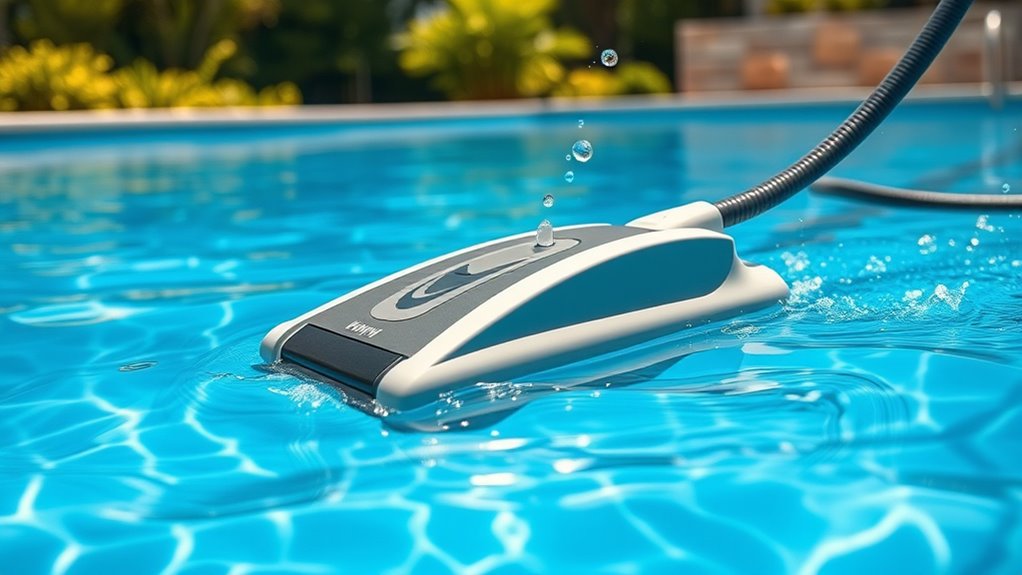If you want a budget-friendly, straightforward pool cleaning option for small to medium-sized pools with simple shapes, a suction cleaner is a smart choice. It attaches to your pool’s filtration system, requires minimal maintenance, and effectively reaches tight spots and corners. If you prefer a low-cost, reliable solution that’s easy to install and maintain long-term, a suction cleaner fits well. Keep exploring for more insights on optimizing your pool’s cleaning setup.
Key Takeaways
- Ideal for small to medium pools with simple shapes and minimal debris for cost-effective, reliable cleaning.
- Suitable when you want a straightforward, low-maintenance option compatible with existing filtration systems.
- Best choice for pools requiring frequent cleaning, especially saltwater pools needing corrosion-resistant equipment.
- Preferable when targeting dirt in corners, steps, and tight spots due to their ability to access hard-to-reach areas.
- Appropriate if you seek a budget-friendly, durable solution with lower initial costs and less automation.
Understanding the Basic Functionality of Suction Pool Cleaners
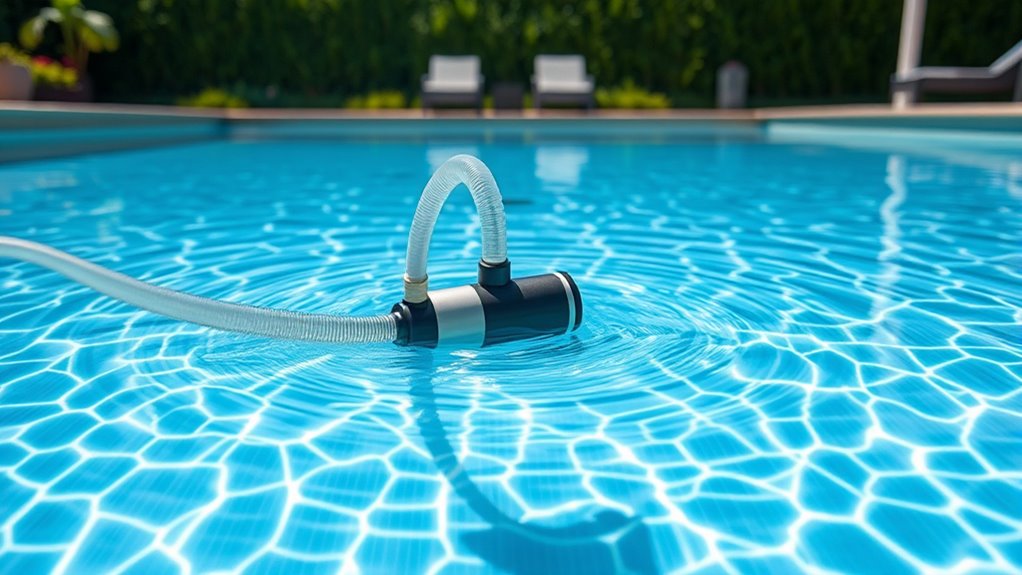
Suction pool cleaners operate by attaching to your pool’s filtration system and using the existing water pressure to move around. This design allows them to efficiently pick up dirt, debris, and algae, enhancing overall pool cleaning efficiency. As they glide across the pool floor and walls, they rely on the suction created by the pump to vacuum debris into the filter. To keep your cleaner working effectively, you should establish regular maintenance routines, such as cleaning the filter and inspecting hoses for blockages. These simple steps prevent clogs and ensure consistent performance. Since they use the pool’s existing filtration system, suction cleaners are typically low-cost and easy to operate, making them a popular choice for maintaining a clean, inviting swimming environment. Additionally, understanding the importance of contrast ratio can help you choose a cleaner that performs well in various lighting conditions around your pool area. Regularly checking the filtration system ensures optimal suction power and prolongs the life of your cleaner. Moreover, maintaining proper water chemistry can prevent buildup and improve overall cleaning efficiency. Proper system compatibility is essential to ensure your suction cleaner functions effectively with your pool’s specific setup. Using the right maintenance routine can further enhance the longevity and effectiveness of your suction cleaner.
Ideal Pool Types and Sizes for Suction Cleaners
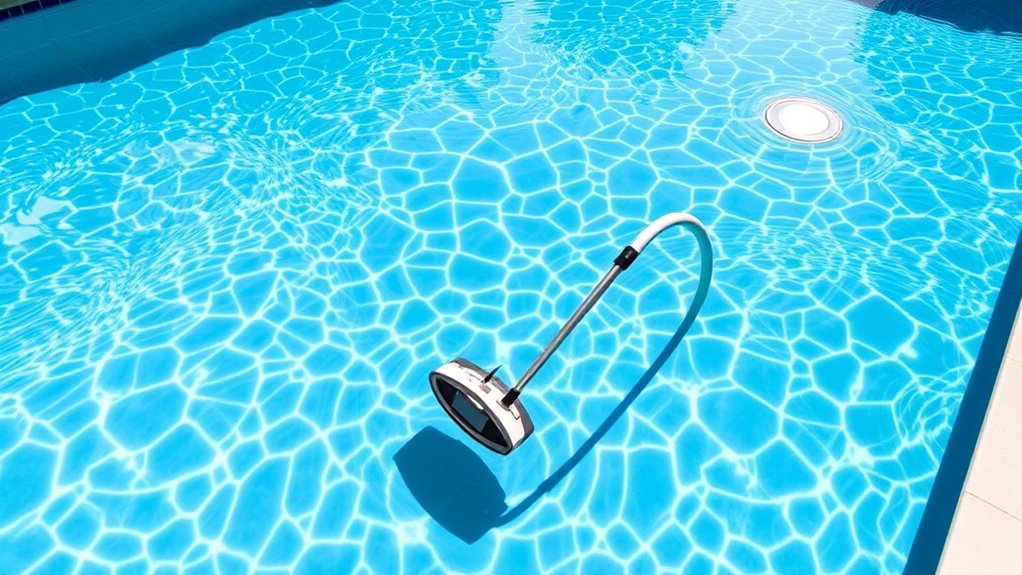
Are suction pool cleaners the right choice for your pool? If you have a smaller to medium-sized pool with a simple shape, they’re a great fit. Suction cleaners excel on flat, smooth pool surfaces, providing effective debris removal without the need for extensive setup. They work best in pools with moderate debris, such as leaves, dirt, and algae, especially if the pool isn’t heavily cluttered. If your pool is large or has intricate features like stairs or corners, a suction cleaner might struggle to reach all areas efficiently. For ideal performance, ensure your pool’s size and surface type align with the cleaner’s capabilities. This way, you get thorough debris removal and keep your pool sparkling with minimal hassle. Proper pool surface maintenance can also enhance the effectiveness of suction cleaners. Additionally, choosing a model with appropriate suction power ensures better cleaning results, especially in pools with more stubborn debris. To maximize efficiency, consider the pool shape and layout, as some models are better suited for specific configurations. Being aware of your pool’s size and features can help you select the most suitable cleaning device for optimal results. Regularly inspecting and maintaining your filter system can further improve the suction cleaner’s performance and longevity.
Cost-Effectiveness and Maintenance Considerations
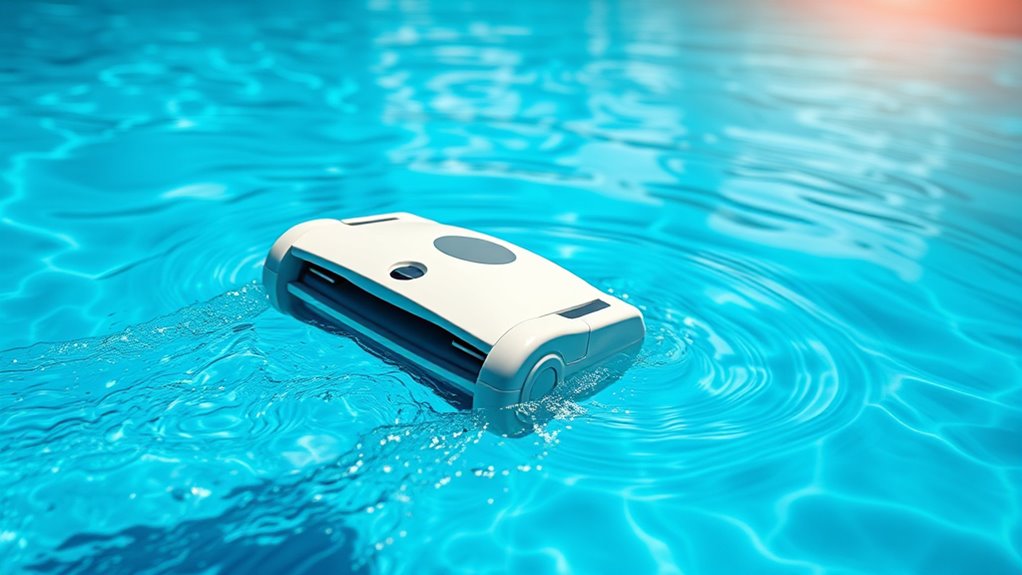
When considering a suction pool cleaner, cost-effectiveness and maintenance routines play a significant role in your decision. A favorable cost comparison means you’ll spend less over time, especially since suction cleaners typically have lower upfront costs. They generally require simple maintenance routines, like cleaning the filter bag and checking hoses, which keeps your pool sparkling without extra expenses. Proper maintenance also helps prevent clogging and extends the lifespan of your cleaner. Regularly inspecting and replacing parts when needed ensures optimal performance and prolongs your cleaner’s lifespan. Keep in mind, though, that neglecting routine upkeep can reduce efficiency and increase long-term costs. Here’s a quick overview:
| Cost Comparison | Maintenance Routines | Emotional Impact |
|---|---|---|
| Lower initial cost | Easy cleaning tasks | Peace of mind, worry-free |
| Less ongoing expense | Minimal parts needed | Confidence in reliability |
| Budget-friendly | Quick upkeep | Satisfaction in savings |
Choosing wisely ensures your pool stays pristine without breaking the bank.
Compatibility With Your Pool’S Filtration System
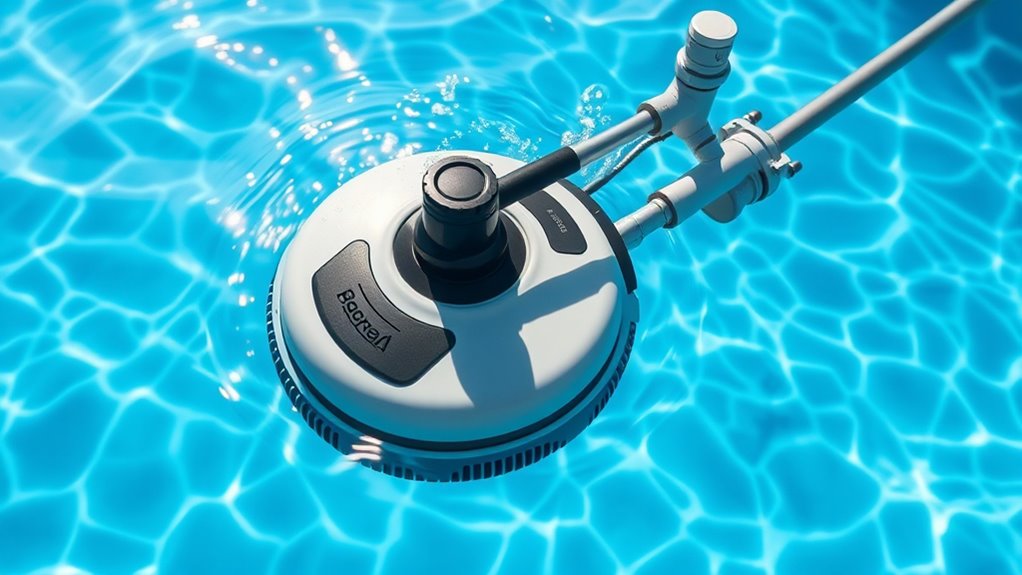
Make sure your pool cleaner matches your filtration system‘s filter type to guarantee ideal performance. Check that your pump has enough power to handle the cleaner without straining, and verify that the connection fits your setup. Compatibility here prevents frustration and keeps your pool spotless. Additionally, selecting a cleaner compatible with your modern pool technology can enhance efficiency and longevity. Ensuring proper vacuum filtration compatibility supports optimal cleaning results and extends the lifespan of your equipment, especially when considering the specific filter system compatibility requirements of your pool.
Filter Type Compatibility
Choosing a suction pool cleaner that matches your pool’s filtration system is essential for ideal performance. Filter compatibility determines how well the cleaner works without overloading or damaging your system. Some cleaners are designed for specific filter types—sand, cartridge, or DE filters—so ensure yours matches the cleaner’s requirements. A compatible filter system helps optimize debris capacity, allowing the cleaner to pick up more debris without clogging or reducing suction power. If your filter type isn’t compatible, you might experience poor cleaning results or damage your filtration system. Always check the manufacturer’s specifications to confirm the cleaner’s debris capacity aligns with your pool’s needs, ensuring smooth operation and effective cleaning without putting undue stress on your filtration system. Proper filter type compatibility also reduces the need for frequent maintenance and prolongs the lifespan of your pool equipment. Additionally, understanding your filter’s maintenance requirements can help prevent issues that may arise from incompatible cleaners. Being aware of the filter system’s performance can further assist in selecting a cleaner that works seamlessly with your existing setup, especially considering that environmental contaminants like oils and debris can impact filtration efficiency if not properly managed.
Pump Power Requirements
Ensuring your pool’s pump provides adequate power is essential for the suction pool cleaner to operate effectively. If your pump isn’t compatible with your pool size, the cleaner may struggle to pick up debris or move efficiently. Check your pump’s horsepower and flow rate to match the cleaner’s requirements. Larger pools require more powerful pumps to maintain proper suction. Failure to meet pump compatibility can lead to poor cleaning performance or strain on your system. Consider these points:
- Pool size influences needed pump power
- Confirm pump flow rate matches cleaner specs
- Larger pools require higher horsepower pumps
- Incompatible pumps reduce cleaning efficiency
- Regularly monitor pump performance to ensure consistent cleaning results. Being aware of industry standards for pump specifications can help you select the right equipment for your pool’s needs. Additionally, understanding Mazda Tuning principles can help you optimize your system for better efficiency and longevity. Proper system maintenance also plays a crucial role in maintaining optimal pump performance and extending the lifespan of your equipment. Recognizing angel numbers related to love and transformation can inspire a positive mindset that encourages proper care of your pool system. Matching your pump’s power to your pool size ensures ideal performance and longevity of your suction cleaner.
Connection Compatibility
Your pool’s filtration system plays a key role in how well your suction cleaner works. To guarantee compatibility, check the hose length and debris capacity. The hose must be long enough to reach all pool areas without tangling or losing suction. If the hose is too short, it limits coverage and efficiency. Additionally, verify that your system can handle the debris capacity of the cleaner; a system with inadequate power may clog or reduce suction, making cleaning less effective. Some suction cleaners connect via standard fittings, while others require adapters. Make sure the connections are secure and compatible with your skimmer or dedicated suction line. Proper connection compatibility guarantees smooth operation and thorough cleaning, saving you time and effort. Recognizing exploration’s importance can guide you in understanding how different components work together for optimal performance.
Benefits of Suction Cleaners in Hard-to-Reach Areas
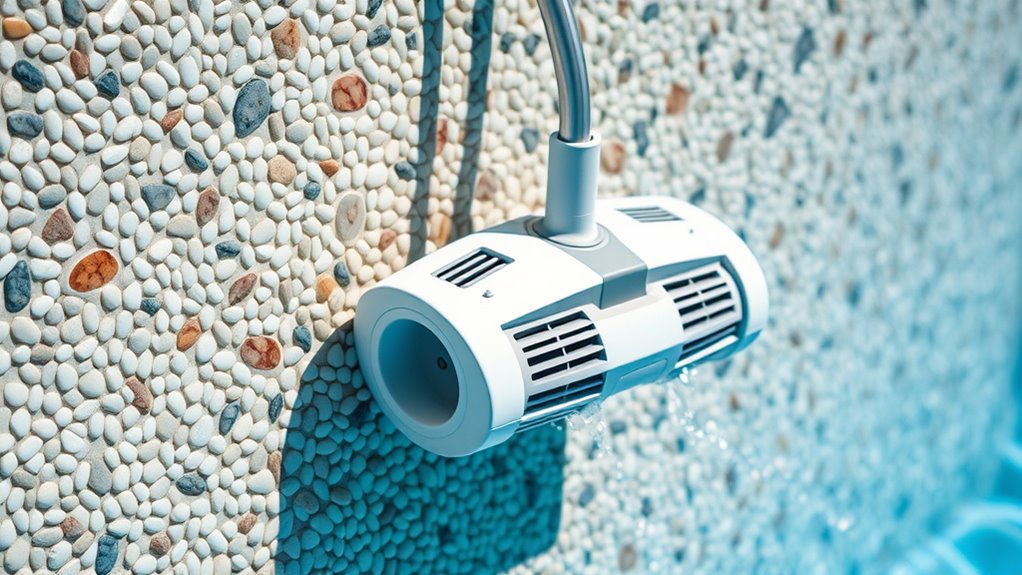
Suction cleaners excel at removing dirt precisely where it hides, ensuring your pool stays spotless. They can access tight spots and corners that other cleaners often miss. This makes them especially effective for thorough cleaning in hard-to-reach areas.
Precise Dirt Removal
Hard-to-reach areas like corners, tight crevices, and beneath steps can be challenging to clean effectively with traditional pool vacuums. Suction pool cleaners excel here by providing precise dirt removal, ensuring no debris is missed. They adapt well to your pool’s unique geometry, making cleaning more thorough. This targeted approach benefits your pool chemistry by reducing leftover debris that could affect water quality. Plus, suction cleaners are energy efficient, saving you money while maintaining excellent cleanliness. Their ability to focus on hard-to-access spots means fewer manual interventions and a healthier pool environment. By choosing a suction cleaner, you ensure detailed cleaning in tricky spots, supporting your pool’s overall maintenance and efficiency.
- Effective debris pickup in tight spaces
- Reduced chemical imbalance risks
- Improved overall water clarity
- Lower energy consumption
Access to Tight Spots
Because many pools have complex shapes and narrow corners, accessing these tight spots can be a challenge with traditional cleaners. Suction pool cleaners excel here, thanks to their ability to navigate tight spaces effectively. Their design allows for better robot compatibility, enabling them to reach areas other cleaners might miss. Plus, their cleaning speed ensures these hard-to-reach spots are cleaned quickly and thoroughly. Unlike some robotic cleaners that may struggle with narrow corners, suction models maintain constant contact with surfaces, ensuring no dirt is left behind. This makes them ideal for pools with intricate layouts, where precision cleaning in tight spots is essential. If your pool has tight corners or complex features, a suction pool cleaner offers unmatched access and efficiency.
Comparing Efficiency With Other Cleaning Technologies
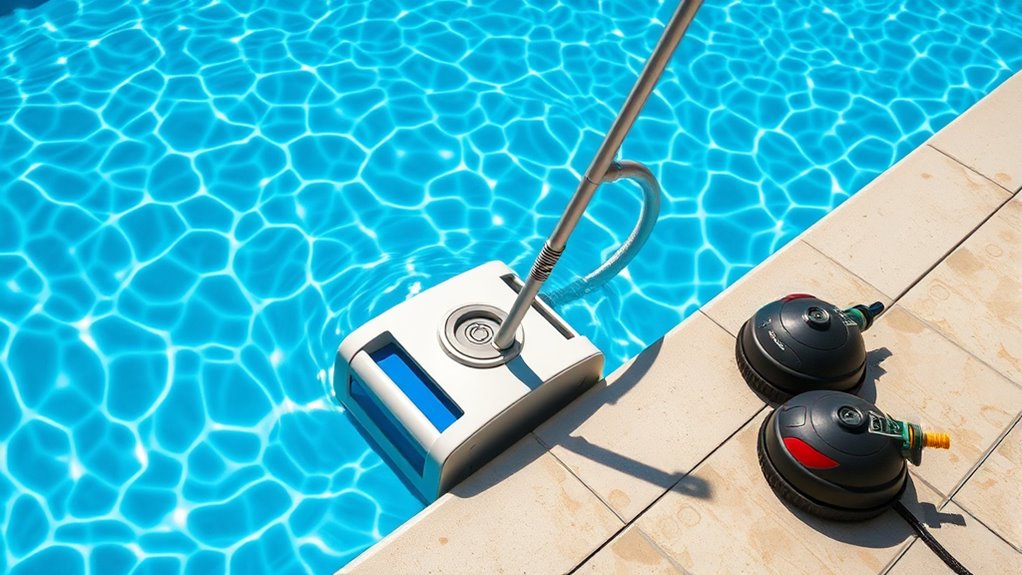
When evaluating pool cleaning options, it’s important to contemplate how suction pool cleaners compare in efficiency to other technologies like robotic or pressure-side cleaners. Suction cleaners excel in simplicity and cost-effectiveness but may require more manual operation, especially in larger pools. They work well with proper chemical balancing, ensuring debris is easier to pick up. However, robotic cleaners often provide more thorough coverage, while pressure-side units handle larger debris better. Consider these points:
- Suction cleaners are less automated, needing manual setup
- They depend on proper chemical balancing for optimal performance
- Robotic cleaners typically offer better coverage and efficiency
- Pressure-side cleaners excel at handling bigger debris
Your choice depends on balancing ease of use, debris size, and the level of manual operation you’re willing to perform.
Situations Where Suction Cleaners Outperform Robotic and Pressure Cleaners
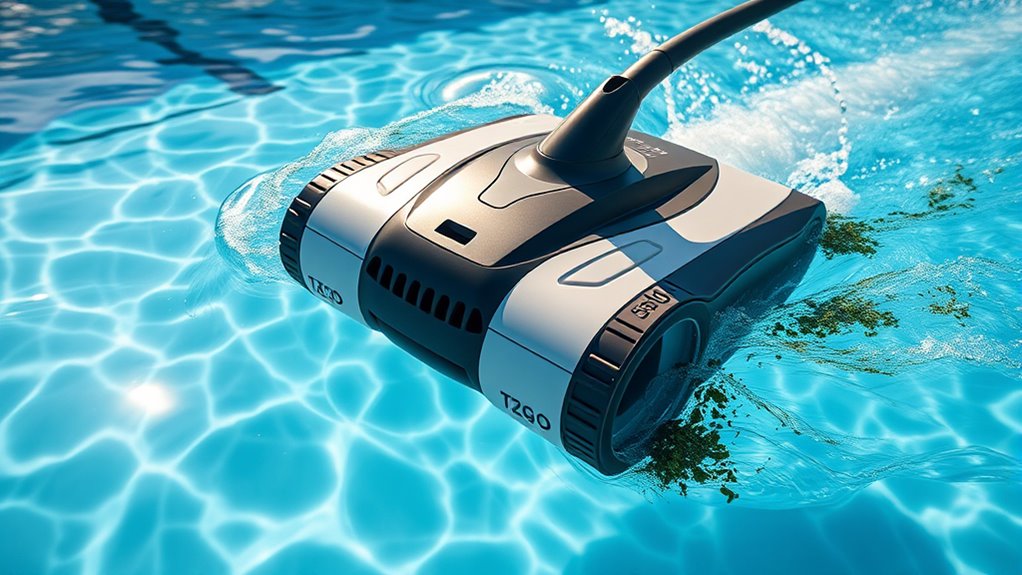
Suction pool cleaners often outperform robotic and pressure-side models in situations where simplicity, cost, and ease of maintenance matter most. If your pool has complex pool chemistry or requires seasonal operation, these cleaners excel because they adapt easily without extra programming or equipment. They handle debris effectively in smaller or moderate pools, especially when frequent cleaning isn’t needed year-round. Maintenance is straightforward, saving you time and money.
| Situation | Advantage of Suction Cleaner | Best Use Case |
|---|---|---|
| Complex pool chemistry | Less sensitive to chemical imbalances | Regular maintenance |
| Seasonal operation | Easy to store and operate seasonally | Infrequent use |
| Budget constraints | Lower initial cost | Cost-effective cleaning |
| Simple pool shapes | Easy to navigate | Standard pools |
| Minimal setup | No complicated installation | Quick deployment |
Installation and Ease of Use for Suction Pool Cleaners
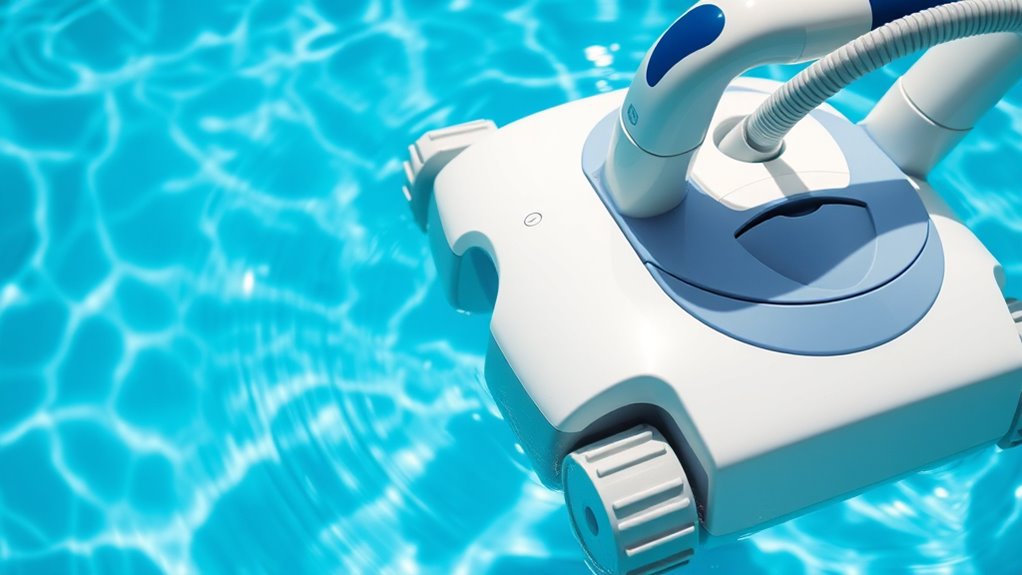
Installing a suction pool cleaner is straightforward and doesn’t require complex tools or technical skills. Most setups involve attaching the hose to your skimmer or dedicated suction port and ensuring it moves freely. Common installation challenges include securing the hose properly and avoiding tangles that can hinder performance. Once installed, the cleaner is easy to operate and maintain, with minimal adjustments needed. To keep it running smoothly, you’ll want to regularly check for blockages and clean the filter bag. Here are some key points:
Installing a suction pool cleaner is simple, involving minimal tools and easy maintenance for reliable performance.
- Attaching the hose securely to prevent leaks
- Positioning the cleaner for ideal coverage
- Avoiding hose tangles during operation
- Simplified maintenance routines for longevity
Long-Term Durability and Performance Factors
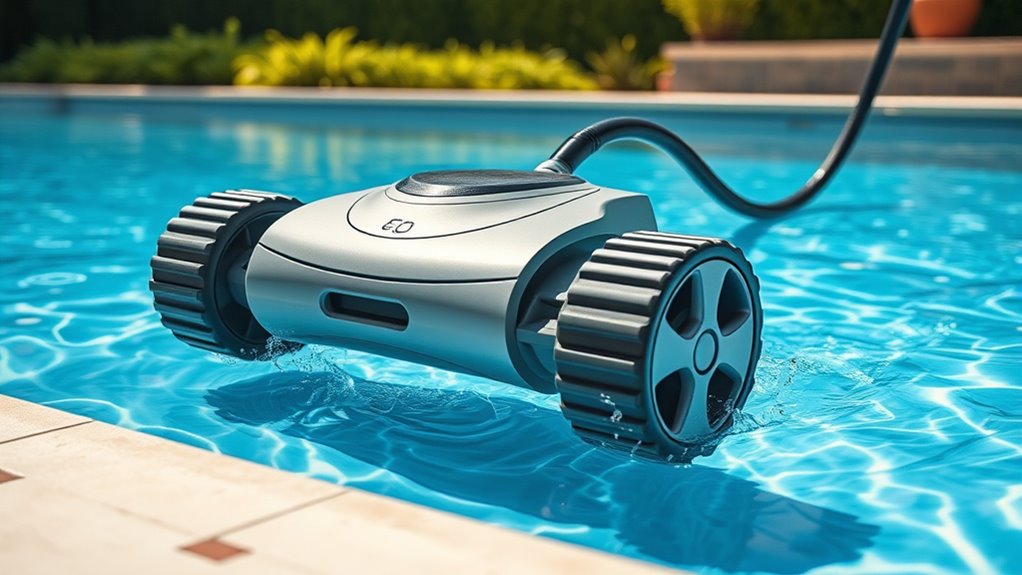
To guarantee your suction pool cleaner performs reliably over time, paying attention to durability factors is essential. Durability testing reveals how well the cleaner’s components withstand regular use and harsh conditions. Focus on material resilience—high-quality plastics, rubber, and seals ensure the cleaner resists cracking, wear, and chemical damage. Check for corrosion-resistant parts, especially if you have a saltwater pool. A sturdy build minimizes breakdowns and extends the cleaner’s lifespan. Regular maintenance also plays a role; cleaning filters and inspecting parts help maintain peak performance. Ultimately, investing in a model with proven durability and resilient materials saves you money and hassle, making sure your pool stays clean season after season without frequent replacements or repairs.
Frequently Asked Questions
Can Suction Pool Cleaners Handle Large Debris Effectively?
Suction pool cleaners are generally effective at handling small to moderate debris, but large debris can pose a challenge due to their limited debris capacity and suction power. If your pool has lots of large debris, you might find yourself emptying the cleaner frequently or missing some debris altogether. For better performance with large debris, consider a cleaner with a bigger debris capacity or a different type, like a robotic or pressure-side cleaner.
How Do Suction Cleaners Perform on Uneven Pool Surfaces?
Uneven pool surfaces may seem tricky, but suction pool cleaners excel with surface adaptability. You’ll notice their debris collection efficiency remains steady, even on rough or irregular terrains. Unlike some cleaners that struggle, suction models adjust well, ensuring thorough cleaning without missing spots. So, you can trust your suction cleaner to handle uneven surfaces effectively, keeping your pool pristine with minimal effort.
Are Suction Pool Cleaners Suitable for Above-Ground Pools?
If you’re wondering whether suction pool cleaners work well for above-ground pools, the answer is yes. They’re typically compatible with above-ground setups, making them a popular choice. Plus, they usually come at a lower cost compared to robotic cleaners, offering great value. Just make certain your pool’s size and shape match the cleaner’s specifications for effective cleaning. Overall, suction cleaners are a practical, budget-friendly solution for maintaining your above-ground pool.
Do Suction Cleaners Require Professional Installation or Setup?
Ever wonder if you need a magic wand—or a professional—to set up your suction pool cleaner? Usually, you don’t. Most suction cleaners have simple installation requirements and straightforward setup complexity, making them perfect for DIY enthusiasts. You just connect the hose to your skimmer, guarantee proper suction, and you’re ready to go. No fancy tools or expert help needed—just a bit of patience and a keen eye.
How Quiet Are Suction Pool Cleaners During Operation?
Suction pool cleaners are generally quiet during operation, with low noise levels that won’t disrupt your relaxation time. The operation sound is minimal, making them ideal if you want a cleaning device that works efficiently without creating loud noise. You’ll likely notice only a gentle hum, so you can enjoy a peaceful pool environment while it cleans. Their quiet operation makes them a popular choice for noise-sensitive users.
Conclusion
Think of choosing a pool cleaner like selecting the right compass for a journey. When your pool’s layout is intricate or your filtration system can lend a hand, a suction cleaner guides you efficiently through the waters. It’s your trusty compass in the vast ocean of cleaning options, helping you navigate hard-to-reach corners with ease. With the right choice, you’ll enjoy sparkling clear waters, making your pool the tranquil harbor you always envisioned.
